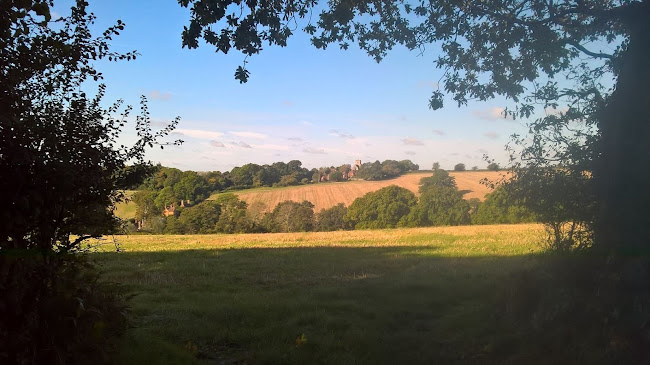Sunday, January 31, 2016
Creation procliams
One other little thing that has so far interested me in reading a bit of Athanasius, On The Incarnation is that the great man appears to think of creation as proclaiming not merely 'God's invisible qualities--his eternal power and divine nature' (Romans 1:20) but as 'confessing Christ as Lord.' (ch 3, section 15, Fig book edition p26).
The Image of God
What exactly it means for men and women to be created 'in the image of God' (Genesis 1:27) is much discussed.
I've been reading a little bit of Athanasius, On The Incarnation, and I've been struck by the way in which he relates humanity's creation in the image of God to Christ the Image of God (Colossians 1:15; 2 Corinthians 4:4).
For example:
'Upon them, therefore, upon men who, as animals, were essentially impermanent, He bestowed a grace which other creatures lacked—namely the impress of His own Image, a share in the reasonable being of the very Word Himself, so that, reflecting Him and themselves becoming reasonable and expressing the Mind of God even as He does, though in limited degree they might continue for ever in the blessed and only true life of the saints in paradise
ch 1, section 3, my Fig Books edition 2013, p12
Man, who was created in God's image and in his possession of reason reflected the very Word Himself, was disappearing, and the work of God was being undone.
ch 2, section 6, p15
He saw the reasonable race, the race of men that, like Himself, expressed the Father's Mind, wasting out of existence, and death reigning over all in corruption.
ch 2, section 8, p16
But, in fact, the good God has given them a share in His own Image, that is, in our Lord Jesus Christ, and has made even themselves after the same Image and Likeness. Why? Simply in order that through this gift of Godlikeness in themselves they may be able to perceive the Image Absolute, that is the Word Himself, and through Him to apprehend the Father; which knowledge of their Maker is for men the only really happy and blessed life.
ch 3, section 11, p21
If so, what was the use of having made them in His own Image originally? It would surely have been better for them always to have been brutes, rather than to revert to that condition when once they had shared the nature of the Word.
ch 3, section 13, p23
In order to effect this re-creation, however, He had first to do away with death and corruption. Therefore He assumed a human body, in order that in it death might once for all be destroyed, and that men might be renewed according to the Image. The Image of the Father only was sufficient for this need.
ch 3, section 13, p24
We have seen that to change the corruptible to incorruption was proper to none other than the Savior Himself, Who in the beginning made all things out of nothing; that only the Image of the Father could re-create the likeness of the Image in men, that none save our Lord Jesus Christ could give to mortals immortality, and that only the Word Who orders all things and is alone the Father's true and sole-begotten Son could teach men about Him and abolish the worship of idols.
ch 4, section 20, p30'
Whether or not we follow Athanasius in all the details, I reckon it is worth pondering the relationship between humanity as God's image bearers and Christ as the Image of God.
I've been reading a little bit of Athanasius, On The Incarnation, and I've been struck by the way in which he relates humanity's creation in the image of God to Christ the Image of God (Colossians 1:15; 2 Corinthians 4:4).
For example:
'Upon them, therefore, upon men who, as animals, were essentially impermanent, He bestowed a grace which other creatures lacked—namely the impress of His own Image, a share in the reasonable being of the very Word Himself, so that, reflecting Him and themselves becoming reasonable and expressing the Mind of God even as He does, though in limited degree they might continue for ever in the blessed and only true life of the saints in paradise
ch 1, section 3, my Fig Books edition 2013, p12
Man, who was created in God's image and in his possession of reason reflected the very Word Himself, was disappearing, and the work of God was being undone.
ch 2, section 6, p15
He saw the reasonable race, the race of men that, like Himself, expressed the Father's Mind, wasting out of existence, and death reigning over all in corruption.
ch 2, section 8, p16
But, in fact, the good God has given them a share in His own Image, that is, in our Lord Jesus Christ, and has made even themselves after the same Image and Likeness. Why? Simply in order that through this gift of Godlikeness in themselves they may be able to perceive the Image Absolute, that is the Word Himself, and through Him to apprehend the Father; which knowledge of their Maker is for men the only really happy and blessed life.
ch 3, section 11, p21
If so, what was the use of having made them in His own Image originally? It would surely have been better for them always to have been brutes, rather than to revert to that condition when once they had shared the nature of the Word.
ch 3, section 13, p23
What, then, was God to do? What else could He possibly do, being God, but renew His Image in mankind, so that through it men might once more come to know Him? And how could this be done save by the coming of the very Image Himself, our Savior Jesus Christ? Men could not have done it, for they are only made after the Image; nor could angels have done it, for they are not the images of God. The Word of God came in His own Person, because it was He alone, the Image of the Father Who could recreate man made after the Image.
ch 3, section 13, p24
We have seen that to change the corruptible to incorruption was proper to none other than the Savior Himself, Who in the beginning made all things out of nothing; that only the Image of the Father could re-create the likeness of the Image in men, that none save our Lord Jesus Christ could give to mortals immortality, and that only the Word Who orders all things and is alone the Father's true and sole-begotten Son could teach men about Him and abolish the worship of idols.
ch 4, section 20, p30'
Whether or not we follow Athanasius in all the details, I reckon it is worth pondering the relationship between humanity as God's image bearers and Christ as the Image of God.
Jesus Our Big Brother (Hebrews 2:10-end)
A sermon introduction & outline:
Whether or not we have an elder brother, I guess we could
imagine the ideal, perfect big brother.
Someone we loved
and admired, who was a role model for us – perhaps even a hero to us.
Imagine you were
about to start secondary school.
It would be good
to have an older brother who had gone there before you.
He’d know just
what it was like to go from being one of the oldest in your little village
school of about 100 pupils, to the one of the youngest in a school of nearly
2000.
He could
sympathise when you got lost, or when you were bewildered by the range of
subjects.
He understands
that all the different teachers take a bit of getting used to.
And he can help
you out:
He can alert you
to the ways of Mr Smith, the geography teacher.
And he can
explain to you how the canteen works – recommend to you the best puddings and
tell you what meals to avoid.
Perhaps there’s a
bully at the school:
A pupil in the
year above who terrorises all you first years.
To you it seems
like the whole school is in the bully’s power.
But your big
brother can come and sort him out.
He beats him up
and the bully won’t mess with you again: he’s utterly defeated, his grip is
broken.
Maybe you don’t
turn out to be such a good student as your big brother.
Your coursework
is due and you’ve done next to nothing for it.
You’re bound to
fail.
It would be a
total disaster.
Leaving aside the
ethics of it for a moment, wouldn’t it be amazing if your big brother handed in
his assignment for you, and you got top marks?
Perhaps you get
into dreadful trouble at school and you’re about to be expelled, but your big
brother takes the punishment for you.
(1)
Jesus became our big brother so that he could
understand what it’s like to be human, sympathise with us and help us (v18).
(2)
Jesus became our big brother so that he might
destroy that bully the devil who held the power of death against us (vv14-15)
(3)
Jesus became our big brother so that he might
solve our big problem by making atonement for our sins (v17)
The full audio version should be available here in due course.
Subscribe to:
Posts (Atom)




